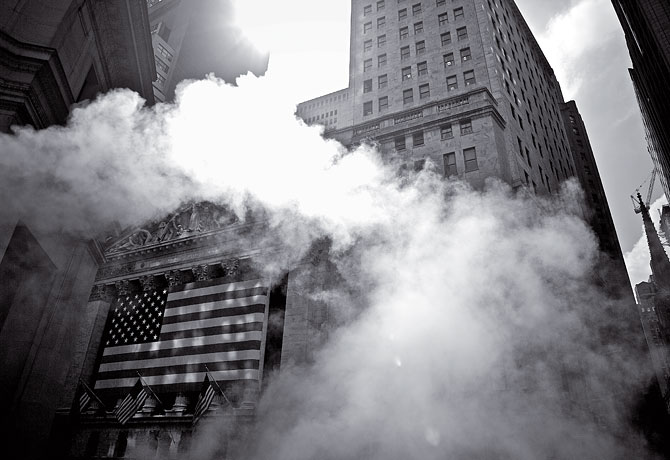
Losing steam
The financial crisis has challenged the capitalist myths justifying Wall Street's wealth and clout
In late January, the Graubünden, Switzerland's most easterly canton, is not where you go to see signs of spring. In its high valleys, along whose paths armies trudged from the lowlands of Italy to the German heartland during the Thirty Years' War, snow lies thick on the ground. Off the main roads, hamlets sit silent under the weight of it, reminders that until the 20th century, this part of Europe — so obviously prosperous now — was a rural backwater, its people as much as its livestock spending the long winter in a sort of quiet hibernation.
But as the global business and political élite prepare for their annual trek to this winter wonderland — making the journey from Zurich to Davos by train, car or, if they are still very rich, helicopter — they will think they can detect some signs of life in the ground beneath their feet. Not yet gentians and edelweiss — those are months away. But scrabble under the snow, and you'd find some of those famous green shoots.
They weren't there a year ago. At the World Economic Forum's annual meeting in 2009, the mood was dire. As growth contracted, credit froze and trade evaporated, attendees at Davos fretted over rising protectionism and the loss of confidence in the world's economic and political leadership, lamented the hardship brought upon the poor and unemployed and warned of the unthinkable consequences if the global community failed to take drastic action. Russian Prime Minister Vladimir Putin said the world economy was in "the first truly global economic crisis," one that was "continuing to develop at an unprecedented pace." A rare expression of optimism came from Chinese Premier Wen Jiabao, who predicted that his nation would reach 8% growth in 2009 despite plunging exports and millions of job losses — though he admitted that reaching that target would be tough.
Leaders collecting in Davos for this year's meeting can breathe more easily. The prospects for the world economy have brightened. Trade is recovering, banks are repairing themselves, and consumers are returning to shopping malls. Dominique Strauss-Kahn, managing director of the International Monetary Fund (IMF), said recently that "the recovery goes faster than expected." Wen now appears prophetic, as China is expected to meet or even exceed, his bold prediction of a year ago. The recessions in the world's biggest economies, including the U.S., Japan and Germany, have ended. Even some of the worst-hit are showing signs of life. Taiwan's chip-fabrication labs and LCD factories are humming again after the island's economy experienced record quarterly GDP contractions at the height of the crisis.
Of course, the perfect storm that struck the world economy in 2008 is not yet over. Many of the conversations in Davos this year will concentrate not on the elements of recovery but on the risks that lie ahead. But it would be surprising if the delegates did not also concern themselves with two other matters linked to but distinct from the recession: a change in the intellectual climate in which the global economy operates, and the geopolitical consequences of the crisis and recession.
Walking a Tightrope
In strictly economic terms, it's not hard to display a snapshot of where things stand now. After declining an estimated 2.2% in 2009, the global economy is projected to expand 2.7% in 2010, according to the World Bank. But recovery is fragile. Excess capacity continues to dampen expectations of growth, and the unemployment crisis in the Western world — especially in the U.S. — is likely to get worse before it gets better. The debt overhang from the boom years of the mid-2000s is still there. A recent study by the McKinsey Global Institute analyzed previous periods of deleveraging and found that they often take six to seven years to play out. Charles Roxburgh, the London-based director of the institute, says that in the current crisis, "the process is only just starting or is about to start," which means the world is potentially facing "a several-year period where the deleveraging process will act as a drag on GDP growth." "The worst of the downturn may well be over," Roxburgh adds, "but the impact of this crisis is not over yet."
That's why many economists harbor serious concerns about the strength of the recovery. Stephen Roach, chairman of Morgan Stanley Asia, has maintained that the deleveraging of the U.S. consumer will continue to weigh on global growth. He figures that the bursting of the housing bubble, combined with the recession's shock to employment, will reduce trend growth in real consumption in the U.S. to 1.5% to 2% over the next three to five years, compared with 4% in the precrisis decade. As a result of such headwinds, Roach forecasts, the global economy will experience "the weakest recovery of the modern era," as he wrote in a recent report, with trend growth of world GDP at about 2.5% on average over the next three years. Such an anemic recovery, Roach argues, is close to the "stall speed" for the world economy, making it more susceptible to a double-dip recession — which even Strauss-Kahn of the IMF does not rule out.